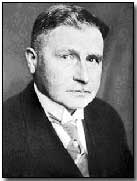Who's Who - Wilhelm Groener
 Wilhelm Groener (1867-1939)
concluded the war as Commander-in-Chief of German forces on the Western
Front and helped prevent a communist revolution by agreeing to deliver army
support to the Social Democratic Party government led by
Friedrich Ebert.
Wilhelm Groener (1867-1939)
concluded the war as Commander-in-Chief of German forces on the Western
Front and helped prevent a communist revolution by agreeing to deliver army
support to the Social Democratic Party government led by
Friedrich Ebert.
Born on 22 November 1867 in Ludwigsburg the son of an NCO, Groener entered the army in 1884. He had risen by 1912 to the head of the railroad department of the general staff with the rank of colonel.
It followed therefore that when war broke out in August 1914 he should be responsible for the rapid deployment of the German army by rail to both eastern and western fronts.
Groener enjoyed a series of promotions during wartime. In August 1915 he was made Major-General and, in May 1916, appointed to the head of a newly-created food supplies unit.
Groener nevertheless retained his railroad responsibilities until his appointment later that autumn as head of the Supreme War Bureau, tasked with the daunting need to ensure delivery of the vast production targets unveiled as part of the Hindenburg programme.
With the advent of the Third Supreme Command, a virtual military dictatorship led by Paul von Hindenburg and Erich Ludendorff, Groener - whose right-wing views happily coincided with those of his masters - became a trusted confidante of both Hindenburg and Ludendorff.
Despite this he was nevertheless regarded with a degree of suspicion on account of his pragmatic recognition of the need for social partnership with workers in order to ensure implementation of the hugely increased production targets required by the military high command.
Thus in July 1917 he suggested worker participation in management, along with price restraints to act against patently excessive industrial profiteering. His insistence upon social partnership appeared to be his undoing when, in August 1917, he was abruptly despatched to the Western Front in command of a division.
In February 1918 Groener was transferred to the east as Eichhorn's Chief of Staff and required to supervise the economic exploitation of the Ukraine.
With Ludendorff's resignation of 29 October 1918 Groener was unexpectedly recalled to Berlin and appointed deputy Chief of Staff (to Hindenburg). Rapidly summarising the military situation he promptly authorised a withdrawal of German forces in France.
Never a bashful personality he next informed Chancellor Max von Baden of the imperative need for an armistice on 6 November. Even more remarkable it was Groener who took upon himself the apparently unpalatable responsibility of instructing Kaiser Wilhelm II of the unavoidable need to abdicate on 9 November.
The same day as his meeting with the Kaiser Groener met with incoming Chancellor Ebert - leader of the Social Democratic Party (SPD) - and negotiated an agreement whereby he would guarantee military support for a republican government so long as Ebert promised not to reform the officer corps. Ebert's agreement ensured the continuing participation of the military in the post-war German political scene.
Overseeing the demobilisation of the army - having been responsible for their original despatch - Groener retired from active service in September 1919. He then embarked upon a political career, serving as Minister of Communications from 1920-23, Minister of Defence from 1928-32 and as Minister of the Interior from 1931-32.
Having opposed Nazi infiltration of the army Groener also sought to ban its paramilitary arm, the SA, in 1932. This action brought his political downfall later that year.
The author of several military histories Wilhelm Groener died in Bornstedt, near Potsdam, on 3 May 1939 at the age of 71.
"Wipers" was the British nickname for the Belgian town Ypres.
- Did you know?
